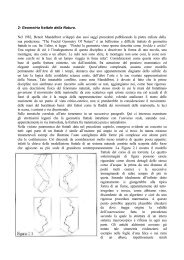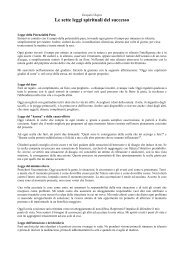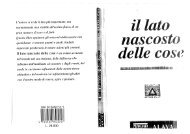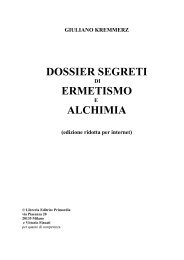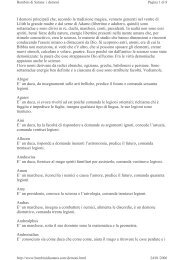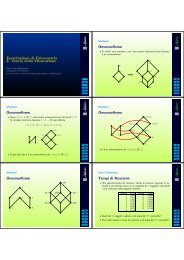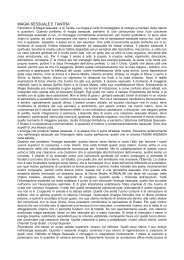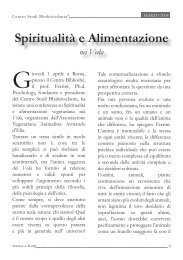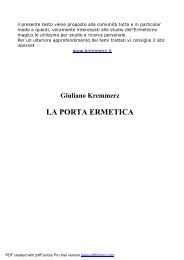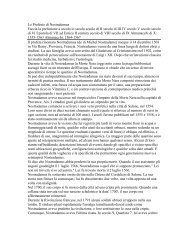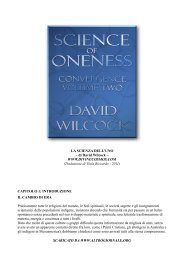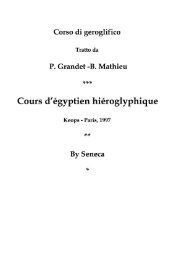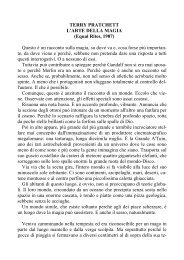Yale University Press NEW HAVEN & 9 780300"089028 - Sito Mistero
Yale University Press NEW HAVEN & 9 780300"089028 - Sito Mistero
Yale University Press NEW HAVEN & 9 780300"089028 - Sito Mistero
- No tags were found...
Create successful ePaper yourself
Turn your PDF publications into a flip-book with our unique Google optimized e-Paper software.
4 ~ TALIBANwas tried and sentenced to death, first by the Islamic High Court of Kandaharand then on appeal by the Taliban Supreme Court. These were trialswithout lawyers where the accused is presumed guilty and expected todefend himself.The Taliban's interpretation of the Sharia or Islamic law demanded theexecution of the murderer by the victim's family, but not before a lastminuteappeal is made by the judge to the victim's relatives to spare themurderer. If they granted mercy the victim's family would receive bloodmoney or monetary compensation. But how much of this interpretationof Islamic law by the Taliban is owed to the Sharia and how much isowed to the Pashtun tribal code of behaviour or Pashtunwali, is whatis disputed by many Muslim theologians, both inside Afghanistan and;beyond.By now some 20 male relatives of the victim had appeared on the pitch jand the Qazi turned to them. Raising his arms to the sky, he appealed tothem to spare the life of Abdullah in exchange for blood money. 'You will 1go to Mecca ten times if you spare this man. Our leaders have promised topay a huge sum to you from the Baitul Mai [Islamic fund] if you forgive jhim,' he told the relatives. As the relatives all shook their heads in refusal,the Taliban guards pointed their guns at the crowd and warned that they|would shoot anyone who moved. There was silence in the stands.Abdullah, who had been seated throughout the proceedings in another 1pick-up guarded by armed Taliban, was now let out. Wearing a brightjyellow skullcap and new clothes, his feet shackled with heavy manacles,!his arms chained behind his back, he was told to walk to the goalposts at]one end of the stadium. His legs visibly shook with fear as he shuffledacross the pitch, his chains clanking and glinting in the sunlight. When!he reached the goalposts, he was made to kneel on the ground with his!face turned away from the crowd. A guard whispered to him that he could jsay his last prayer.A guard handed a kalashnikov to a relative of the murdered victim, iThe relative swiftly stepped up to Abdullah, cocked the automatic andjfrom a few feet away shot him three times in the back. As Abdullah felon to his back the executioner moved alongside his twitching body and]at point-blank range pumped three more bullets into his chest. Within]seconds his body was thrown into the back of a pick-up and driven away.)The crowd quickly and silently dispersed. As we drove back into tovthin slivers of smoke arose from the bazaar as tea stalls and kebab stlit up for their evening trade.A mixture of fear, acceptance, total exhaustion and devastation after jyears of war and more than 1.5 million dead have forced many Afghans]to accept the Taliban ways of justice. The next day in a village nearjKabul, a woman was stoned to death by a baying crowd after being sen-INTRODUCrnON: AFGHANISTAN'S HOLY WARRIORS ~ 5tenced for trying to flee Afghanistan with a man who was not her bloodrelative. Amputations of either one hand or one foot or both are commonTaliban punishments for anyone caught stealing. When they capturedKabul in September 1996, to be initially welcomed as liberators, manyKabulis and the world turned away in disgust after the Taliban torturedand then publicly hanged former President Najibullah, the ex-communiststrongman who for four years had been living in a UN compound underUN protection.Since the end of the Cold War no other political movement in theIslamic world has attracted as much attention as the Taliban in Afghanistan.For some Afghans the Taliban created hopes that a movement ledby simple Islamic students with an agenda of bringing peace to the countrymight succeed in finally disposing of the warlord factions which haddevastated people's lives since the communist regime in Kabul had beenoverthrown in April 1992. Others feared that the Taliban movementwould quickly degenerate into one more warlord faction, determined tothrust despotic rule upon the hapless Afghan people.The Pashtun Taliban have also brought the question of inter-ethnicrelations in a multi-ethnic state to the forefront, as well as other issuesincluding the role of Islam versus clan, tribal and feudal structures and thequestion of modernization and economic development in a conservativeIslamic society. Understanding the Taliban phenomenon is made evenmore difficult because of the excessive secrecy that surrounds their politicalstructures, their leadership and the decision-making process withinthe movement. The Taliban do not issue press releases, policy statementsor hold regular press conferences. With their ban on photography andtelevision, nobody knows what their leaders even look like. The one-eyedTaliban leader Mullah Mohammed Omar remains an enigmatic mystery.After the Khmer Rouge in Cambodia, the Taliban are the most secretivepolitical movement in the world today.Yet the Taliban have inadvertently set a new agenda for Islamic radicalismin the entire region, sending shock waves through Afghanistan'sneighbours. Not surprisingly, Iran, Turkey, India, Russia and four of thefive Central Asian Republics - Uzbekistan, Kazakhstan, Kyrgyzstan andTajikistan - have backed the anti-Taliban Northern Alliance with armsand money to try and halt the Taliban's advance. In contrast Pakistanand Saudi Arabia have backed the Taliban. In the post-Cold War era,this has created unprecedented polarization across the region. The Talibanvictories in northern Afghanistan in the summer of 1998 and theircontrol of over 90 per cent of the country, set in motion an even fiercerregional conflict as Iran threatened to invade Afghanistan and accusedPakistan of supporting the Taliban.At the heart of this regional stand-off is the battle for the vast oil and




